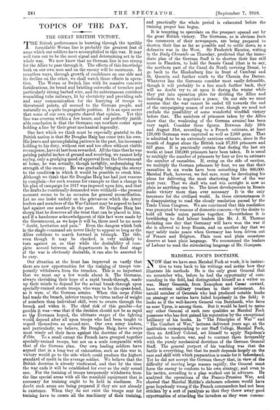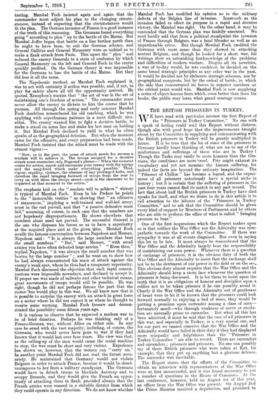MARSHAL FOCH'S DOCTRINE. N OW that we have seen Marshal Foch
at work, it is instruc- tive to turn back to his writings and notioe how they illustrate his methods. He is the only great General that we remember who, before he had the opportunity of com- manding in the field, had distinguished. himself as a writer on war. Many Generals, from Xenophon and Cesar onward, have written military treatises in their retirement. An untold number of Generals who had produced notable books on strategy or tactics have failed hopelessly in the field; it looks as if the well-known General von Bernh.ardi, who faces us near Ypres, is among them.. But it would be hard. to name any other General of such rare qualities as Marshal Foch possesses who has first gained his reputation by the exceptional brilliancy of his books. In " The Principles of War " and " The Conduct of War," lectures delivered years ago at the institution corresponding to our Staff College, Marshal Foch, then an Artillery Colonel, set himself to apply Napoleon's methods to modern war, and to contrast them favourably with the purely mechanical doctrines of the German General Staff. The general purport of his teaching was that the battle is everything, but that its result depends largely on the care and skill with which preparation is made for it,bektand. Yet he did not accept the German theoey that, in view, of the difficulty of moving large masses rapidly, the General must force the enemy to conform to his own strategy, and even, to his tactics, according to a plan worked out in advance. He analysed the operations of the Franco-Prussian War, and showed that Marshal Moltke's elaborate schemes would have gone hopelessly wrong if the French commanders had not been stricken by a sort of • ralysis so that they threw away good opportunities of attaem the invaders as they were eoncen- e: trating. Marshal Foch insisted again and again that the commander must adjust his plan to the changing circum- stances, instead of expecting that the circumstances would fit the plan. The German invasion of France is a good instance of the truth of this reasoning. The Germans found everything going " according to plan ' up to the battle of the Marne. But Marshal Joffre began that battle on a line further north than he ought to have been, to suit the German scheme, and General Gallieni and General Maunoury were so unkind as to make a flank attack from Paris. This upset the " plan " and reduced the enemy Generals to a state of confusion by which General Maunoury on the left and General Foch in the centre quickly profited. On the German theory it was impossible for the Germans to lose the battle of the Marne. But they did.lose it all the same.
The Napoleonic method, as Marshal Foch explained it, was to act with certainty if action was possible, and, if not, to play for safety above all till the opportunity arrived. He quoted Xenophon's maxim that " the art of war is the art of maintaining one's freedom of action." The commander must never allow the enemy to dictate to him the course that he pursues. All through the spring and early summer Marshal Foch doubtless remembered his old teaching, which he was applying with superhuman patience in a most difficult situ- ation. The enemy wanted him tofight a decisive battle, to make a stand on some line and stake his last man on holding it. But Marshal Foch declined to yield to what he often speaks of as the geographical delusion. But when the moment came for the offensive, and every preparation had been made, Marshal Foch insisted that the attack must be made with the utmost vigour:- " Now, as in the past, the mass of attack needs for success a resolute will to achieve it. The troops assigned for a decisive attack must remember only Bugeaud's phrase—' When the moment comes for action, march and encounter your enemy with the energy and the sang-froid which make everything possible.' Thus, vigour, rapidity, violence, the absence of any prolonged halts, and therefore the rapid bringing forward of troops from the rear to carry on with them the troops ahead—such is the character to be imparted at that moment to the action."
The emphasis laid on the " resolute will to achieve " victory is typical of Marshal Foch. Even In his Preface he points to the "'immutable verities " as showing that " an offensive of manoeuvre," implying a well-trained and well-led army, must in the end prevail, and that " a passive defensive must fail," assuming, of course, in each case that the numbers are not hopelessly disproportionate. He shows elsewhere that numbers alone need not prevail. The successful General is the one who disposes his forces so as to have a superiority at the required place and at the given time. Marshal Foch recalls the famous conversation between Napoleon and Moreau. Napoleon said : " It is always the large numbers that beat the small numbers." " •But," said Moreau, " with small armies you have often defeated large armies." " Even then," replied Napoleon, " it was always the small number that was beaten by the large number " and he went on to show how he had always concentrated his mass of attack against the enemy's weak where he thus had a temporary superiority. Marshal Foch discussed the objection that such rapid concen- trations were impossible nowadays, and declined to accept it. If proper use was made of railways and other technical means, great movements of troops would still be possible. He was right, though he did not perhaps foresee the part that the motor-'bus would play in this war. We all know now that it is possible to surprise the enemy with an attack in great force on a sector where he did not expect it or where he thought to receive some warning. Marshal Foch foresaw and demon- strated the possibility some fifteen years ago.
It is curious to observe that he expected a modern war to be of brief duration. Perhaps he was thinking only of a Franco-German war, without Allies on either side. In any case he erred with the vast majority, including, of course, the Germans, who would never have gone to war if they had known that it would last over four years. His view was that, as the calling-up of the men would cause the social machine to stop, the war must be short and very violent. Experience has shown us, however, that the women can " carry on." In another point Marshal Foch did not read the future accu- rately. He maintained that Germany would not violate Belgium in order to attack France, because it would be disad- vantageous to her from a military standpoint. The Germans would have to detach troops to blockade Antwerp and to occupy Brussels, and they would give the French an oppor- tunity of attacking them in flank, provided always that the French armies were massed in a suitable district from which they could operate in any direction. We do not know whether Marshal Foch has modified his opinion as to the military defects of the Belgian line of invasion. Inasmuch as the invasion failed to effect its purpose in a rapid and decisive victory, the Marshal was right. On the other hand, it may be contended that the German plan was faultily executed. We need hardly add that from a political standpoint the invasion of France through Belgium was a fatal blunder as well as an unpardonable crime. But though Marshal Foch credited the Germans with more sense than they showed in attacking neutral Belgium, and though he looked for a short war, his writings show an astonishing foreknowledge of the problems and difficulties of modern warfare. Despite all its novelties, a war of to-day would, he was confident, be decided on the same broad strategic principles as any other war in the past. It would be decided not by elaborate strategic schemes, nor by geographical conquests, but by the ordeal of battle, in which the side that concentrated its forces in superior numbers at the critical point would win. Marshal Foch is now supplying a series of object-lessons from which, even better than from his books, the public may learn what grand strategy means.



























 Previous page
Previous page